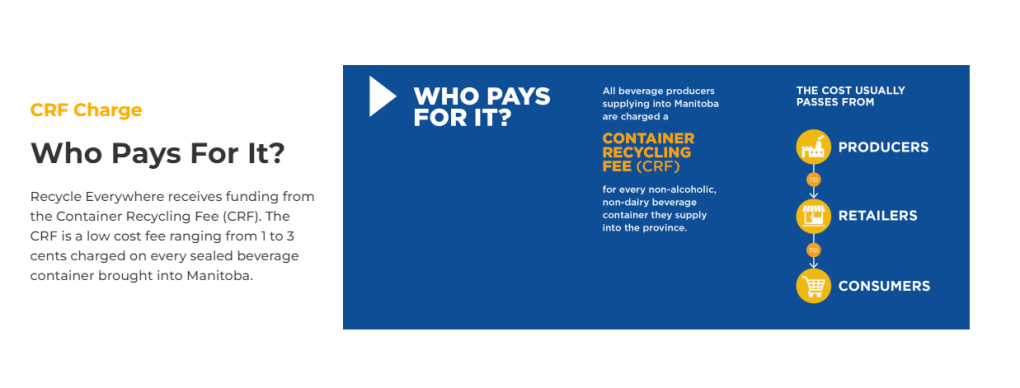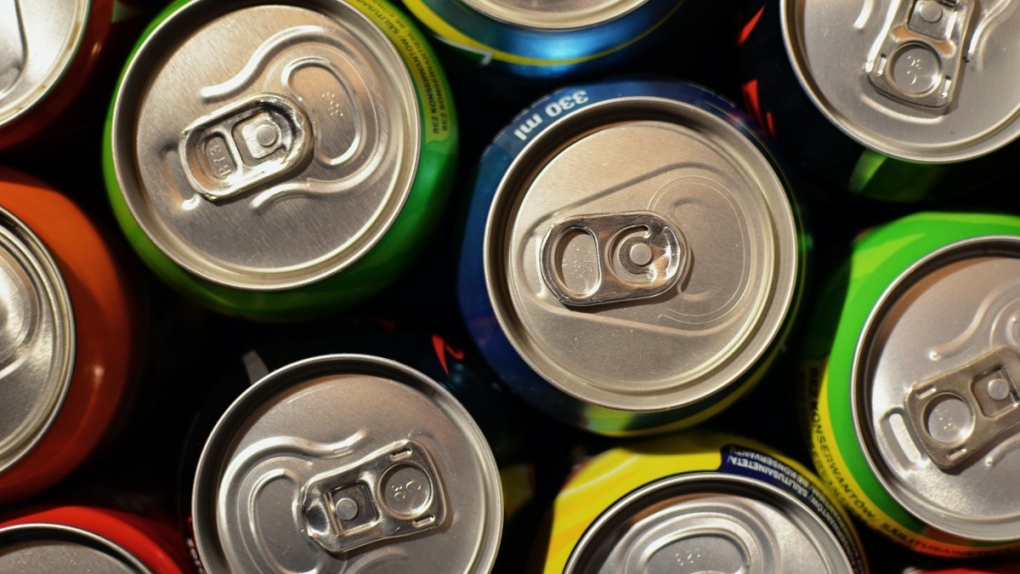Ontario producers of pop and juice face recycling fees next month. Here's how it impacts you
Producers of non-alcoholic beverages are set to impose new recycling fees on Ontario consumers next month as environmental advocates argue the province should take cues from the Beer Store and implement a different system.
The Canadian Beverage Container Recycling Association (CBCRA) is imposing the fees on beverage companies as of June 1, about two months later than originally planned to allow for further consultation.
The CBCRA is an industry-funded organization made up of large waste producers, with stewards like Coca Cola, Loblaw Companies ltd and Nestle Canada.
These companies are technically on the hook for these fees, which vary between one and three cents per item. The initiative, called “Recycle Everywhere,” is part of Ontario’s Blue Box regulations and puts the onus on producers of waste to fund recycling systems.
However, the CBCRA told CTV News Toronto earlier this year that producers have “discretion” over whether to pass along the costs to consumers, indicating that individuals could see the fees on checkout receipts for items like pop, juice, or bottled water.
A chart on their website shows the trickle-down effect of how this could occur, with producers charging retailers, who in turn up the pricetag of their items.
 A chart on the Canadian Beverage Container Recycling Association's Recycle Everything website.
A chart on the Canadian Beverage Container Recycling Association's Recycle Everything website.
Over the last few months, the Ontario government has reiterated their expectation that consumers not be charged additional fees to support the recycling program, but officials stopped short of saying if there will be any consequences for companies that choose to subsidize the cost.
“It’s our expectation that producers are able to mitigate any additional costs on consumers by leveraging their extensive experience in operating similar programs in other jurisdictions while utilizing new technology and innovation available to them,” a spokesperson for the minister of environment said in a statement to CTV News Toronto this week.
“Large beverage producers are fully aware of the Government of Ontario’s position on recycling fees. Our expectations have been made clear, there should be no new fees imposed on consumers in Ontario.”
1.7 BILLION PLASTIC BOTTLES WASTED IN ONTARIO
The CBCRA says it plans to install 250,000 new recycling bins across the province as part of the Ontario’s pledge to recover 80 per cent of beverage containers by 2030.
“With over 30 per cent of beverage containers consumed away from home, more beverage container recycling bins in public and private commercial spaces across the province are needed to reach the recovery targets set in the Blue Box Regulation,” Executive Director Ken Friesen said in a statement.
Friesen noted that in Manitoba, a similar program raised beverage container recovery rates from 42 per cent to 72 per cent within 10 years.
The province’s recycling efforts are measured using the weight of blue box materials reused by producers, according to the 2021 regulation outlining the changes.
But environmental advocates warn this recycling program won’t be enough to achieve that 80 per cent return in Ontario.
- Download our app to get local alerts on your device
- Get the latest local updates right to your inbox
Karen Wirsig, Senior Program Manager for Plastics at Environmental Defence, told CTV News Toronto Wednesday that while Ontario’s goals are “pretty significant,” experts do not believe they can realistically be met.
“Our collective experience with these kinds of recycling bin systems is that they're much less effective at getting these materials to the right places for recycling,” she noted.
Wirsig noted the sorting system, in addition to human nature, is working against the government.
“We estimate that 1.7 billion plastic bottles alone are wasted in Ontario every year, meaning they go into the landfills or incinerators or even directly into the natural environment,” she said, adding that there is also no economic incentive to use a blue bin.
“Whereas with deposit return, you put that can in the garbage, you're throwing away 10 cents.”
BEER STORE RETURN SYSTEM CAN WORK FOR POP CANS
A survey conducted by Environics Research and commissioned by Environmental Defence suggests more than three-quarters of Ontarians would support a deposit-return program for non-alcoholic beverage containers.
Under this kind of program, consumers would be charged a recycling fee when purchasing a beverage, but if they were to bring the cans or bottles back, that money would be returned.
In 2021, nearly 80 per cent of packaging and containers sold at the Beer Store were returned and recycled or refilled. There was a 43 per cent collection rate for beverage containers and packaging through Ontario’s blue box system that same year.
“It's net neutral for consumers,” Green Party Leader Mike Schreiner told CTV News Toronto in an interview Thursday.
 Soda cans are seen in this undated photograph. (Pexels)
Soda cans are seen in this undated photograph. (Pexels)
While Schreiner supports moving the financial burden or recycling from municipalities to large waste producers, he says it will be challenging for Ontario to achieve that 80 per cent target without implementing something like a deposit-return system.
“The fact that they're passing those costs on to consumers, I understand why consumers are upset with that. So why not go with a program that has proven to have much higher diversion recycling rates, and will not put the cost burden on to consumers.”
If Ontario implements a deposit-return system, Schreiner says it is possible to reach this target, although he argues the province should be trying to match the federal collection goal of 90 per cent for plastic beverage bottles.
“We also want to just reduce the amount of waste produced in the first place especially plastic waste, given how harmful it is to human health and the environment and animal and marine life health in particular.”
Deposit-return programs for non-alcoholic beverages already exist in Alberta, Saskatchewan, Quebec and British Columbia.
CTVNews.ca Top Stories

Quebec man, 81, gets prison sentence after admitting to killing wife with Alzheimer's disease
An 81-year-old Quebec man has been sentenced to prison after admitting to killing his wife with Alzheimer's disease.
Canada Post quarterly loss tops $300M as strike hits second week -- and rivals step in
Canada Post saw hundreds of millions of dollars drain out of its coffers last quarter, due largely to its dwindling share of the parcels market, while an ongoing strike continues to batter its bottom line.
'Immoral depravity': Two men convicted in case of frozen migrant family in Manitoba
A jury has found two men guilty on human smuggling charges in a case where a family from India froze to death in Manitoba while trying to walk across the Canada-U.S. border.
Prime Minister Trudeau attends Taylor Swift's Eras Tour in Toronto with family
Prime Minister Justin Trudeau is a Swiftie. His office confirmed to CTV News Toronto that he and members of his family are attending the penultimate show of Taylor Swift's 'The Eras Tour' in Toronto on Friday evening.
Trump supporters review-bomb B.C. floral shop by accident
A small business owner from B.C.'s Fraser Valley is speaking out after being review-bombed by confused supporters of U.S. president-elect Donald Trump this week.
Pat King found guilty of mischief for role in 'Freedom Convoy'
Pat King, one of the most prominent figures of the 2022 'Freedom Convoy' in Ottawa, has been found guilty on five counts including mischief and disobeying a court order.
Nearly 46,000 electric vehicles recalled in Canada over power loss risk
Nearly 46,000 electric vehicles from Kia, Hyundai and Genesis are being recalled in Canada over a potential power loss issue that can increase the risk of a crash.
Trump chooses Bessent to be Treasury secretary and Vought as top budget official
President-elect Donald Trump announced Friday that he'll nominate hedge fund manager Scott Bessent, an advocate for deficit reduction, to serve as his next treasury secretary. Trump also said he would nominate Russel Vought to lead the Office of Management and Budget.
Canada's tax relief plan: Who gets a cheque?
The Canadian government has unveiled its plans for a sweeping GST/HST pause on select items during the holiday period. The day after the announcement, questions remain on how the whole thing will work.


































